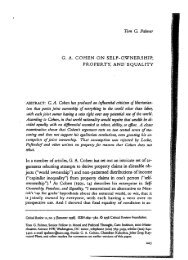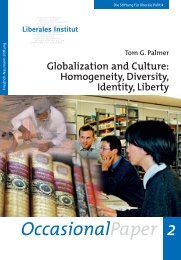Are Patents and Copyrights Morally Justified? - Tom G. Palmer
Are Patents and Copyrights Morally Justified? - Tom G. Palmer
Are Patents and Copyrights Morally Justified? - Tom G. Palmer
Create successful ePaper yourself
Turn your PDF publications into a flip-book with our unique Google optimized e-Paper software.
~44 HarvardJournal of Law & Public Policy [Vol. 13<br />
or a novel. We should not pretend that all connection between<br />
the artist <strong>and</strong> the creation is severed the first time the work is<br />
sold.”° 8<br />
Representative Markey, like the philosophers who have influenced<br />
him, has misunderstood the ontology of the work ofart.<br />
The connection between “theartist <strong>and</strong> the creation” is indeed<br />
severed, not the first time the work is sold, but the moment that<br />
it is finished.’ 09<br />
Referents ofdiscourse can enjoy various kinds ofdependent<br />
being. They may, for example, be dependent upon another<br />
thing, as in the brightness of a surface being “dependent” on<br />
the surface, or theymay be dependent in another way, as in the<br />
way that ah<strong>and</strong> is dependent for its being on the body to which<br />
it is attached, although the h<strong>and</strong> <strong>and</strong> the body may become separated,<br />
unlike the surface <strong>and</strong> the brightness. t ’ 0<br />
Two senses of dependence are confused by advocates ofpersonality-based<br />
intellectual property theories: the dependence<br />
of the art work on a human agent or agents for its creation, <strong>and</strong><br />
the dependence of that same work of art on a human agent or<br />
agents for its continued existence. While a work of art obviously<br />
depends on its creator(s) for its creation, <strong>and</strong> is therefore<br />
a “translation ofhis freedom into an external sphere,” once it<br />
is created it enjoys its own objectivity. The sign that an art work<br />
exists as an objectivity is that wecan always return to it <strong>and</strong> find<br />
the same work. We do not experience a different work every<br />
time we see or read Shakespeare’s Othello.”<br />
Once created, works of art are independent oftheir creators,<br />
as should be evident by the fact that works of art do not “die”<br />
when their creators do. While no longer dependent on their<br />
creators, they nevertheless remain dependent on some human<br />
108. Markey, Let Artuis Have a Fair Share of Their Profits, N.Y. Times, Dec. 20, 1987,<br />
§ 5, at 2, col. 2.<br />
109. This of course raises the question of when the work is finished. Who would<br />
know when it was finished? Would anyone else undertake to finish Schubert’s “Unfinished<br />
Symphony”? The artist may indeedbe in the privileged position ofdetermining<br />
when a work is finished, but that does not privilege the subjective experience of the<br />
artist in the constitution of the art work as such.<br />
110. Thestrategic differentiation betweenvarious kinds ofdependenceis elaborated<br />
in Husserl, Investigation III: On the Theorj of Wholes <strong>and</strong> Parts, in 2 LOGICAL INVESTIGA-<br />
TIONS 436 0. Findlay trans. 1970); see also PARTS AND MOMENTS: STUDIES IN LoGic AND<br />
FORMAL ONTOLOGY (B. Smith ad. 1982).<br />
111. I used the possessive—”Shakespeare’s”—in describing this play to highlight<br />
the relationship ofdependence that the work does haveon its author. Shakespearehas<br />
been dead for centuries, while Othello lives on. One might say, however, that Shakespeare’s<br />
mind remains active or still “lives” in Othello.











